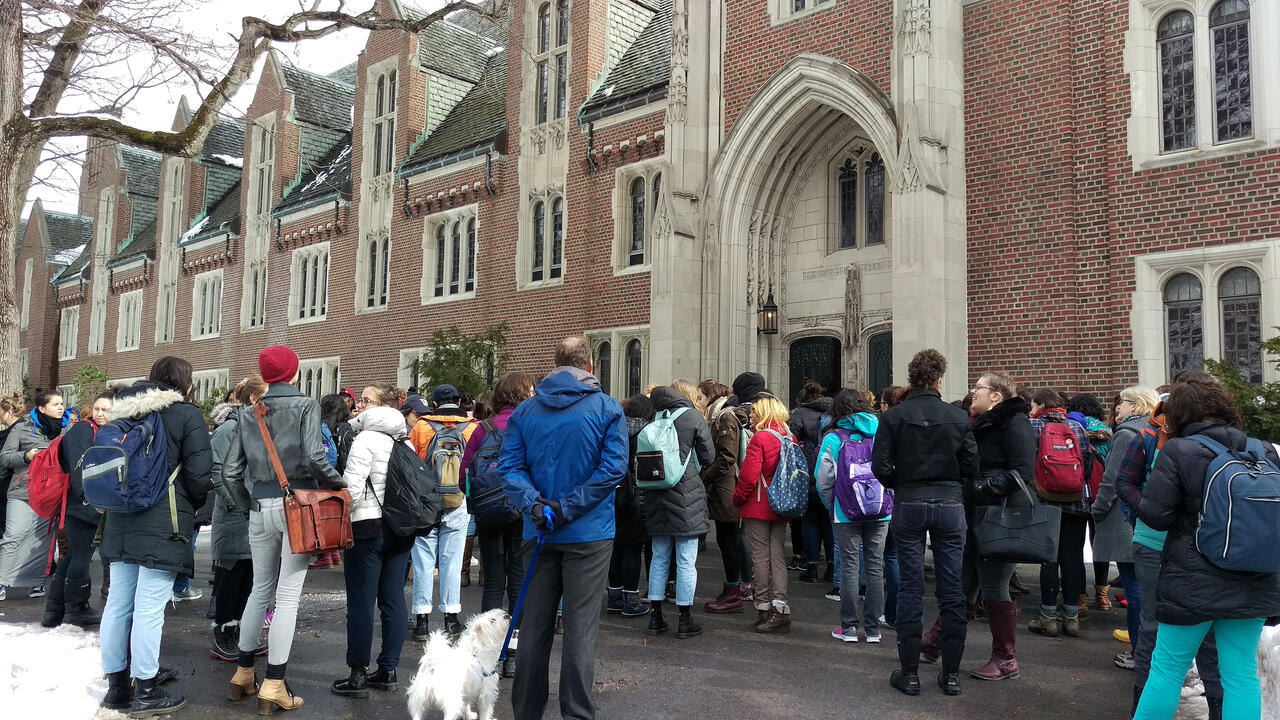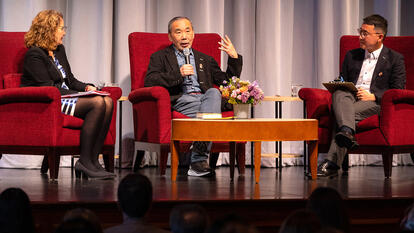Raíz Holds Rally in Support of Undocumented and Muslim Immigrants and Refugees

On Thursday, February 16, students led a rally in the Academic Quad to show support for the human rights of undocumented students, Muslim immigrants, refugees, the immigrant community at large, and those who feel vulnerable and targeted by the Trump administration. Raíz, Wellesley’s Latinx advocacy group, co-sponsored the rally with Wellesley Asian Alliance (WAA), Wellesley Students for Justice in Palestine (WSJP), Wellesley African Students’ Association (WASA), and Babson’s Origins of Necessary Equality (ONE). More than 100 students, faculty, and staff attended to speak about their own experiences and hear those of others.
We interviewed Maria-Alejandra Jaramillo DS ’18 and Gloria Sanchez ’17, who co-founded Raíz in the fall of 2016, about what they hope the Wellesley community will take from the human stories that define who immigrants and refugees are and what they stand for.
Q: Tell us about Raíz’s purpose.
Maria-Alejandra Jaramillo: We wanted to organize the Latinx community on campus to engage in activism. A major part of that is connecting with the community outside of Wellesley, which is something we are doing through volunteer work. We are currently planning a project that involves working with a bilingual elementary school in Boston.
Gloria Sanchez: In creating Raíz, Spanish for the word “root,” and drawing inspiration from the proverb “They tried to bury us, they didn’t know we were seeds,” we aimed to increase the Latinx political presence on campus. Building on the legacy of the siblings who lead both WAAM-SLAM (Wellesley Asian Action Movement – Sisters Leading Action for Multiculturalism) movements and LUChA (Latinx Unidas Changing Academia), we spearheaded the campaign to pressure Wellesley to adopt the term “sanctuary.”
Q: What was the purpose of last Thursday’s rally?
MJ: After Trump issued his executive orders on unauthorized immigration and the Muslim ban, our main focus was to create a space for the targeted communities to share their stories, thoughts, and feelings. This rally gave the Wellesley community an opportunity to listen to what they had to say and understand the severity of the situation.
GS: Apart from raising awareness on this campus, the rally was meant to provide some sort of relief for students and staff who feel immediately affected by Trump’s actions. We hope that these students and staff members know that we will listen to their voices and rally behind them when they want to express their emotions. The rally also underscores the importance of storytelling as a way of bridging connections. As I said in the rally, it’s not enough to talk about valuing diversity, inclusion, and unity. We need to have campuswide conversations about where we all come from, instead of engaging in nonproductive discussions meant to provoke controversy in the name of free speech.
Q: Tell us about some of the stories shared at the rally.
MJ: One student submitted a really powerful piece on the erasure of Black Muslims in discussions surrounding the Muslim ban. She reminded us that Black immigrants also suffer at the hands of immigration enforcement. One staff member spoke about the fear she sees in her community as a result of the recent raids carried out by ICE (Immigration and Customs Enforcement). This fear has even reached the children who go to school with her own kids and who worry about one of their parents being deported.
GS: A few students shared their experience of growing up in fear of separation from their undocumented parents. They told poignant stories that gave a face to the people that Obama deported by the millions and that Trump continues to target. They also expressed the palpable fear they carry with them at Wellesley in an effort to mobilize students to actively resist Trump’s orders and inspire them to create their own spaces of sanctuary.
Q: What is your message to Wellesley?
MJ: Understand the urgency of the matter and take action! It’s easy to forget about the outside world when living in the Wellesley bubble. Deportations are happening just around the corner in cities as close as Framingham, and most people on campus are not aware of it. Members of our Wellesley family, which includes staff, are hurting, and they need our support now more than ever.
GS: Don’t buy into the good, hardworking immigrant narrative used to classify some as more deserving than others and to demonize those who commit human mistakes. Be careful about using language (such as the slogan “We Are All Immigrants”) that erases the violent history of colonization and slavery in the United States. Learn about mass incarceration, police brutality, immigrant detention, and border militarization to understand the way in which the state profits off of human suffering. Address Islamophobia, racism, colorism, etc. within your own families. Leverage your economic and racial privilege by supporting grassroots movements and organizations, like No Más Muertes in Arizona and Movimiento Cosecha!



